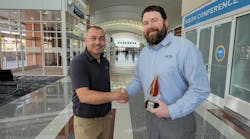APPLETON, Wis., October 5, 2010 — Brent Williams, a Marketing Manager and welding engineer with Miller Electric Mfg. Co.’s TIG Solutions group, will give a presentation titled, “Inverter Technology Improves Aircraft Engine and Component Repair” on Wednesday, Nov. 3 at 4:05 p.m. at the FABTECH show in Atlanta. His remarks are part of the “Weld Repair and the Strengthening of Welded Structures Conference (W22)” held in room C203 of the Georgia World Congress Center.
Williams’ presentation describes the capabilities of GTAW inverters, including the three specific items that profoundly affect welding results: arc start controls, high speed DC pulsing controls and advanced AC wave shaping. Williams will contrast the arc control capabilities of inverters with conventional GTAW technology, then provide an overview of inverter advantages as they pertain to aerospace applications.
Aircraft repair involves welding materials with crack sensitivity, on extremely thin and thick sections, on materials with oxidation and contamination from service conditions and welding exotic alloys and metals with unique chemical compositions and coatings. Challenges include distortion, cracking, controlling heat input, inaccurate weld placement and insufficient or excessive reinforcement. Compared to conventional GTAW technology, inverters provide substantially more arc control, which can enable welding repair technicians to improve quality. Inverter technology is especially suitable for welding low alloy steel, stainless steel, nickel, aluminum, magnesium, titanium, cobalt and refractory metals such as Niobium.




